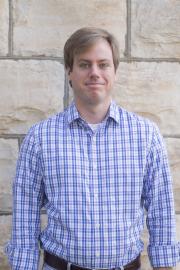Dr. Stephen Waers – Assistant Professor of Theology
swaers@mccks.edu
MCC Start Date: July 2016
Academic History:
- B.A., Point University, 2007
- Humanities and Biblical Studies (Dual Major)
- M.Div., Emmanuel Christian Seminary, 2010
- Concentration: Church History
- Thesis: Contemplation of the Things Lying in Darkness: Cosmogony and Cosmology in the Early Church
- Thesis Advisor: Paul M. Blowers, Ph.D.
- Ph.D., Marquette University, 2016
- Dissertation: Monarchianism and Origen’s Early Trinitarian Theology
- Director: Michel René Barnes, Ph.D.
- Readers: Rev. Joseph Mueller, S.J.; Dr. Marcus Plested; Dr. Ronald Heine
- Successfully defended without revisions March 31, 2016
Ecclesial Experience and/or Passions
Because his dad was a campus minister, Dr. Waers was integrally involved in ministry from a young age. In college, Dr. Waers served in youth ministry and Christian camping. While in grad school, Dr. Waers served the church in a number of lay roles, which included preaching, leading adult Bible studies, organizing worship and prayer services, and hospital chaplaincy. Dr. Waers was ordained to ministry by the elders of Northridge Christian Church (Milledgeville, GA) on July 31, 2016.
Academic Interests and/or Areas of Expertise
Dr. Waers’ graduate work focused on the theology and history of the early church. His dissertation examines the development of Trinitarian theology from 200 – 250 CE. His research also explores Jewish and Christian conceptions of monotheism during the first two hundred years of the life of the church. He has articles published in The Harvard Theological Review, Vigiliae Christianae, The Greek Orthodox Theological Review, and Studia Patristica. In the classroom, Dr. Waers seeks to help his students develop a thoroughly biblical and historically grounded theology that is firmly focused on Christ.
Dr. Waers’ academic interests include the following: the history and theology of the early church (especially Trinitarian theology), the history of biblical interpretation, historical liturgy and Christian worship, theology and food, the history and theology of the Stone-Campbell (Restoration) Movement, and the place and role of tradition in the life of the church.

